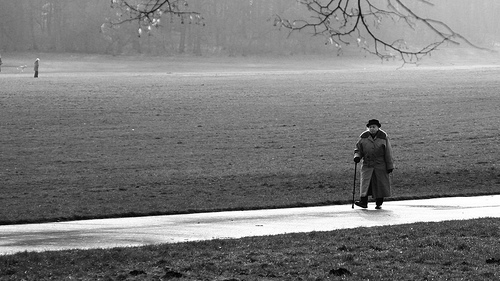Guest Blog by Dr Kate Jackson
The UK trainee perspective (A monthly BJSM blog feature)*
This morning I was walking through woods on one of those glorious crisp days. I stopped in a patch of sunlight, with my North Face hat pulled down over my ears, and I felt a physical upsurge of pure, simple, unadulterated bliss. And a thought floated in my head… “If I can still do this when I’m 80, I’d be happy.”

So as we enter 2012, it’s worth pointing out that alongside the London Olympics, the UK is also hosting the World Congress on Active Ageing for the first time and it got me thinking about ‘active ageing’. What does it mean? How can we help as sport and exercise doctors? What might an active ageing programme look like?
I’m not suggesting for a minute that every person should be instructed to walk in woods (although I’d bet they would enjoy it). The approach needs to avoid being patronising or generic, but instead allow for an individual’s personal circumstances and preference. It needs to encourage inactive people to start fun, low-cost activities that suit them. But it also needs to guide already-active people who develop co-morbidities and give them the confidence to exercise safely despite their illness. It needs to work in partnership in the community with exercise programmes for older people that already exist. The approach should encourage a lasting change in behaviour and in the long-term should not require high levels of external organisation. So can we do this?
Dr Natasha Jones and Dr Julia Newton will be putting theory into practice this year. In December, Nuffield Orthopaedic Centre Sport and Exercise Medicine Department won the Oxfordshire Active Ageing Service bid in an exciting collaboration with Age UK. The service, launching in May, is called ‘Generation Games’.
It will involve an interactive website that will help individuals improve their fitness and health awareness by addressing individual barriers. To help those with chronic disease, there will be a progressive exercise pathway, integrated with current level 1-4 exercise schemes and established specialist rehabilitation schemes. A key piece of work will be the development of pathways for specialist departments not yet providing exercise rehabilitation schemes e.g. diabetes, cancer care, mental health, all of whom would benefit from improved physical activity levels.
The service will be launched through media, online, poster and leaflet-based information systems and promoted through peers, the media, primary care, secondary care, rehabilitation services, community care and Active Ageing partners in the community.
The over-arching ethos of the Generation Games service is self-efficacy and a user-centred approach that has to be the way forward. I wish them every luck in setting up this service, particularly as I may just be needing it in another decade or two…
Related BJSM Publications
J C Davis, M C Robertson, M C Ashe, et. al. 2010. Does a home-based strength and balance programme in people aged ≥80 years provide the best value for money to prevent falls? A systematic review of economic evaluations of falls prevention interventions. BJSM. 44: 80-89. {Short answer is yes! Good evidence to take to your health policy folks to instigate strength and balance training for seniors}. See also Otago Exercise Program (OEP) for detailed instructions on the program. Thanks Prof John Campbell and Clare Robertson for this internationally-adopted program.
Wondering whether it is safe to encourage a senior to be active? See John Campbell’s helpful guide here.
*****************************************************
Dr Kate Jackson is an ST5 Sport and Exercise top-up trainee in the Oxford Deanery. She is interested in good walking, good food and good company